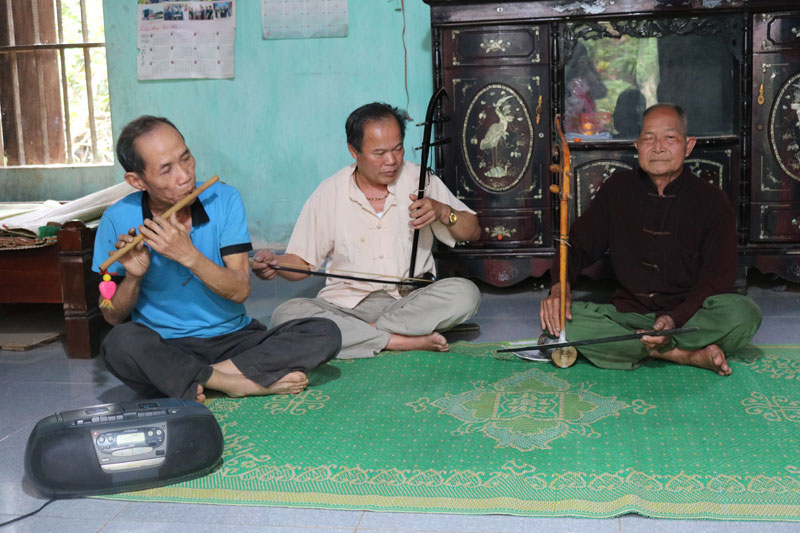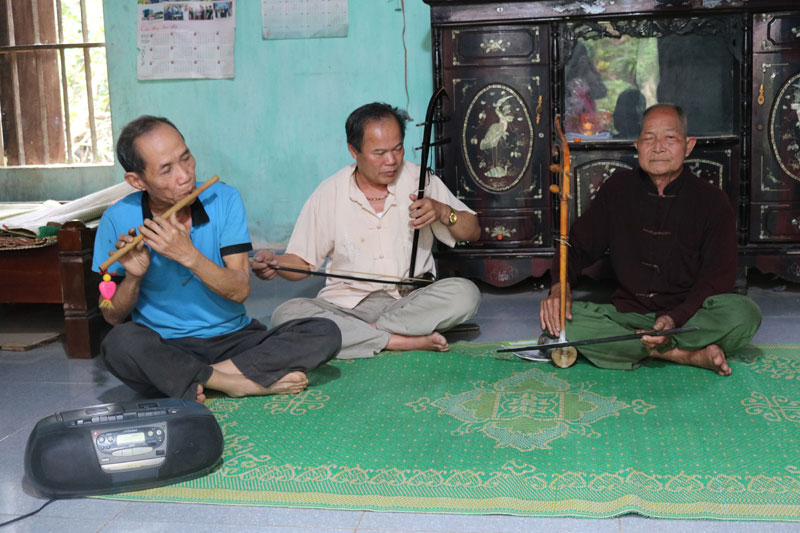
(HBO) - Along with the trend of international integration of Vietnam, more and more new forms of entertainment are emerging, the ethnic music is being faded in modern society. However, the members of the ethnic music club in Doan Ket 2 Hamlet - Phuc Tien Commune - Ky Son District are still devoting all their love, enthusiasm and efforts to keep the ethnic music uninterrupted day by day.

Members of the ethnic musical club of Doan
Ket 2 Hamlet - Phuc Tien Commune during a training session
As a key member of the club, Mr. Bui Van Le
is now 73 years old. At present, Mr. Le is the oldest member and is responsible
for conveying his accumulated experiences for the members.
Since its foundation, the club consisted of
only 15 people, including 5 people in the ethnic musical band and 10 people in
the dance team. During 10 years of operation, up to now, the club has 35
members. Mr. Le's band consists of 5 main members with age of 55 - 73 years
old. Each member is responsible for playing a musical instrument such as: flutes,
monochord, erhu, drum ... All the people were not trained through a
professional institution, only just the person knew and handed over to the
other and practice with each others. The flute, the rhythm and the dances of
the members of the club have contributed to many cultural exchange events in
the villages, communes and exchanges between districts.
Mr. Bui Van Le said: "Our club usually
only meets once a week. Members are busy working during the day so they gather
only in the late afternoons and evenings. They usually play volleyball in the
afternoon and dance in the evening. When there is the opportunity to exchange,
it is necessary to prepare and rehearse the repertoire will be more often. Some
performances are often carried out by the band, such as: Đẻ đất đẻ nước
– When the land and water were known, lưu
thủy
- water flowing, Giang Nam, đêm khuya - late at night, đi đường - on the
road ... ".
Each club's training session is very simple.
With an old cassette player, the members with their instruments, when the music
emerges, the supporting dance team started the soft folk dance with the
colorful costumes of the Muong ethnic girls. Uncle Dinh Thanh Van – the club
member shared "When hearing the sound of the song and the rhythm, I feel
my life is more joyful, forget my old age. The training sessions help us close
together, therefore, raising our big love of musical instruments in every human
being".
With an increasingly vibrant and widespread emulation movement aimed at building cultured residential areas and cultured families, Yen Thuy District has been making steady progress toward improving both the material and spiritual well-being of its people, while fostering a civilized, prosperous, beautiful, and progressive community.
Once lacking recreational spaces and community facilities, Residential Group 2 in Quynh Lam Ward (Hoa Binh City) has recently received attention for the construction of a new, spacious, and fully equipped cultural house. The project followed the model of state support combined with public contributions in both labor and funding.
The "All people unite to build cultural life" movement, which has been effectively integrated with Kim Boi district’s socio-economic development goals, is fostering a lively spirit of emulation across local residential areas, hamlets, villages, public agencies, and enterprises. In addition, through the initiative, traditional cultural values are being preserved and promoted, while community solidarity and mutual support in poverty reduction and economic development are being strengthened.
A working delegation of the Hoa Binh provincial People’s Committee led by its Permanent Vice Chairman Nguyen Van Toan on June 11 inspected the progress of a project to build the Mo Muong Cultural Heritage Conservation Space linked to tourism services in Hop Phong commune, Cao Phong district.
Born and growing in the heroic land of Muong Dong, Dinh Thi Kieu Dung, a resident in Bo town of Kim Boi district, in her childhood was nurtured by the sweet lullabies of her grandmother and mother. These melodies deeply imprinted on her soul, becoming an inseparable part of her love for her ethnic group's culture. For over 20 years, this love for her hometown has driven Dung to research, collect, and pass down the cultural values of the Muong people to future generations.
In the final days of May, the Ethnic Art Troupe of Hoa Binh Province organized performances to serve the people in remote, mountainous, and particularly disadvantaged areas within the province. These were not just ordinary artistic shows, but they were the meaningful journeys aimed at spreading cultural values, enhancing the spiritual life of the people and contributing to the preservation of ethnic minority cultural identities.



